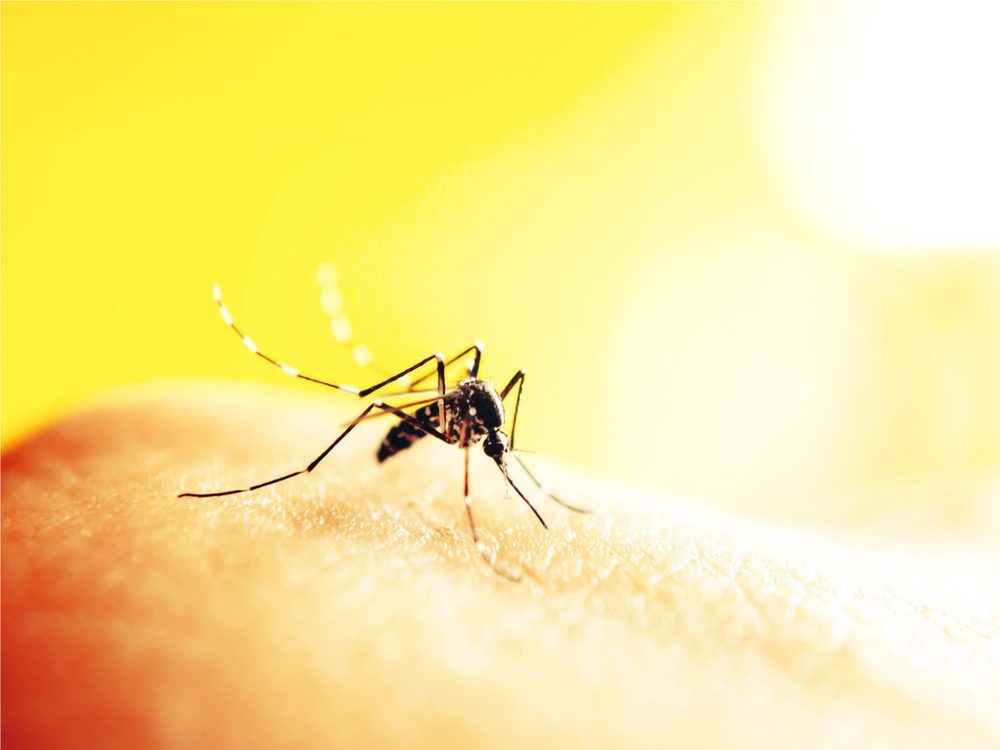6 Ways to Avoid Getting Bitten By a Zika Virus Mosquito
The most effective way to protect yourself from the Zika virus is to prevent mosquito bites.

How to Avoid Zika Virus Mosquito Bites
There are no vaccines or treatments for Zika, the quickly spreading mosquito-borne virus that may be responsible for thousands of birth defects. The most effective way to avoid the disease? Don’t get bit by a mosquito. Here, six crucial steps to protect yourself from Zika virus-infected mosquitoes.
1. Pick the right mosquito repellent
The Centers for Disease Control (CDC) recommends products with active ingredients DEET, oil of lemon eucalyptus, picaridin, or IR 3535.
“DEET is the standard,” Mustapha Debboun, PhD, director of the mosquito control division of Harris County Public Health and Environmental Services in Houston, told NPR. “All the repellents being tested are tested to see if they beat DEET.”
When products with DEET hit store shelves in 1957, there were early concerns about its safety. Some speculated it might be linked to neurological problems. While the long-term effects of DEET haven’t been studied, a 2014 study in the journal Parasites and Vectors found no evidence of negative side effects. Another classic study observed the effects of DEET on pregnant women past their first trimester: Some women used DEET products, while a control group did not. Six months after giving birth, the women’s babies showed no difference in neurological performance, weight, height, head, or arm size.
The mosquito-borne Zika virus is suspected to be behind thousands of recent cases of microcephaly (when a baby is born with an abnormally small head).
There is far more risk in skipping repellent than using it.
What to avoid: The CDC does not recommend non-registered repellents such as citronella oil, cedar oil, geranium oil, peppermint and peppermint oil, “pure” oil of lemon eucalyptus (essential oil not formulated as a repellent), and soybean oil.
2. Apply it correctly
Bug spray should be applied after sunscreen (otherwise, your SPF may mask it). Don’t wear repellent under clothes; it won’t evaporate and may accumulate on the fabric. Avoid spraying it on cuts or wounds.
Importantly, don’t forget to spritz your feet and ankles. The mosquito that carries Zika virus, the Aedes variety, has a particular attraction to feet.
To protect a child, spray repellent on your hands before rubbing it into his or her skin. Avoid children’s eyes and mouth, and use the spray sparingly around the ears. Don’t use repellent with a 30 per cent or higher concentration of DEET. Oil of lemon eucalyptus should not be used on children younger than age 3 (it hasn’t been thoroughly tested on children that young) and repellent should not be used on infants less than 2 months old (protect them in a carrier with mosquito netting).
Follow the product’s instructions for re-application. Bug spray typically doesn’t need to be reapplied as often as sunscreen.
3. Repel with your clothes
You know the drill for avoiding mosquitoes: long pants, long sleeves. Get extra protection with clothing containing permethrin, a synthetic insecticide. The Environmental Protection Agency has determined permethrin products are effective and safe for pregnant women and children.
Since Aedes mosquitos have an appetite for your feet, stick to shoes with full coverage (not sandals) and socks. This is also not a good time for yoga pants—mosquitos can easily bite through Spandex. Generally, baggier clothes offer better protection. Protect your head with a hat and sunglasses.
4. Prep your home
In the wintertime, people are relatively protected from the Zika virus at the moment because mosquitoes die or go into hibernation in cold weather. When temperatures rise to 10 to 15 degrees Celsius, however, mosquitoes can reappear and spread disease. The Aedes mosquitos feed during the day and fly into houses for shade—living and reproducing very close to people.
Just one tablespoon of water can serve as a mosquito breeding ground and produce up to 300 mosquitoes. The insects can breed in the bottom of a glass in the bathroom (like one you use to brush your teeth with) or in a film of water next to the sink. Eliminate standing water throughout the home, including in flower pots, bottles, and accumulating garbage.
Have a pool? No need to drain—mosquitos are deterred by the chlorine that keeps the pool clean and safe for swimming.
5. Exercise indoors
Break a sweat inside. Mosquitoes are attracted to carbon dioxide and heat. Your body naturally emits both, but cranks up the volume when you work out.
6. Travel smart
The best way to avoid Zika virus is to avoid affected areas. Check the CDC’s regularly updated list of countries and territories with active Zika virus transmission. If you must travel to an affected country, stay in air-conditioned areas, sleep under bed nets if your room may have mosquitoes, and use mosquito repellent vigilantly.
If you’re pregnant, talk to your physician, and possibly reconsider your trip. In the past, the CDC has issued advisories for pregnant women to consider postponing travel to affected countries.
Brush up on the 8 Most Common Travel Illnesses—And How to Avoid Them!



